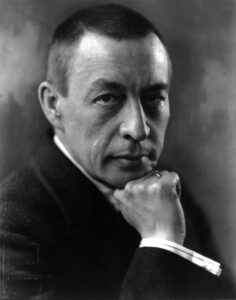
Sergei Rachmaninoff, a Russian composer, pianist, and conductor, was born on April 1, 1873, in Semyonovo, Russia. His contributions to classical music, particularly his lush melodies and virtuosic piano compositions, have solidified his place among the great Romantic composers of the late 19th and early 20th centuries.
Sergei Rachmaninoff’s:
Early musical talent was evident, and he entered the Moscow Conservatory at the age of 12. His breakthrough as a composer came with his Prelude in C-sharp minor, a piece that quickly gained international recognition. Rachmaninoff’s early compositions, marked by rich harmonies and a lyrical sensibility, reflected the influence of the Russian Romantic tradition.Despite early success, Rachmaninoff faced a period of self-doubt following the harsh reception of his Symphony No. 1. This led to a creative block that lasted several years, during which he sought hypnotherapy to overcome his struggles. His triumphant return to composing occurred with his Piano Concerto No. 2 in C minor, one of his most beloved and frequently performed compositions.
Sergei Rachmaninoff’s compositions often featured expansive melodies and intricate harmonies. His Piano Concerto No. 3 in D minor, known for its technical demands, stands as one of the repertoire’s most challenging and iconic piano concertos. His ability to blend Russian melancholy with Western virtuosity set him apart as a composer with a unique and identifiable voice.
In addition to his prowess as a composer, Rachmaninoff was a virtuoso pianist known for his powerful and passionate performances. His piano compositions, including the Prelude in G minor and the Rhapsody on a Theme of Paganini, showcase his extraordinary instrument command.
The Russian Revolution in 1917 had a profound impact on Rachmaninoff’s life. Faced with political upheaval and personal losses, he left Russia in 1918 and eventually settled in the United States. He continued composing and performing there, gaining popularity as a concert pianist.
Rachmaninoff’s later works include his Symphony No. 3, his choral masterpiece, the All-Night Vigil (Vespers), and his Rhapsody on a Theme of Paganini, which demonstrated his ability to infuse classical forms with a modern sensibility.
Suffering from poor health in his later years, Rachmaninoff continued to compose until his death on March 28, 1943, in Beverly Hills, California. His legacy endures through his timeless compositions, which capture the essence of late Romanticism, and his influence on subsequent generations of composers and performers. Sergei Rachmaninoff’s music continues to be celebrated for its emotional depth, technical brilliance, and enduring appeal in classical music.
